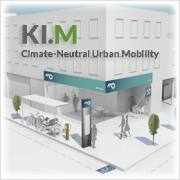Climate-Neutral Urban Mobility | KI.M Project
Digital change is leading to fundamental transformations in urban mobility. To consider these transformations in cross-modal planning and monitoring processes in a timely manner, the KI.M Project builds an AI-based Decision Support Platform for Climate-Neutral Urban Mobility (German Title: KI -basierte Entscheidungsplattform für klimaneutrale urbane Mobilität – KI.M).
KI.M will provide access to a portfolio of datasets and algorithms for different tasks in the context of transport and mobility. The added value of the project lies in the use of Artificial Intelligence (AI) for validating, enriching, linking, and interactively visualizing this data. Thereby, KI.M will support a uniform data ecosystem for climate-friendly urban mobility and will help to avoid isolated solutions.
KI.M Knowledge Base on Urban Mobility
The basis of KI.M is a comprehensive, continuously updated and validated knowledge base that maps the diverse aspects of urban mobility behavior in the respective situational context. The contained multimodal data (anonymized movement data of telecom and mobility app users, weather, environmental indicators, open data, public debate, etc.) are automatically linked using a domain-specific knowledge graph. In addition to automated linking, the contextualization of the data plays a decisive role, e.g. when forecasting event-related mobility or the influence of weather on intermodal route chains. This enables providers to assess whether an innovative mobility solution is advisable for a specific use case, or whether existing resources can be distributed more efficiently.
KI.M Knowledge Graph on Urban Mobility
AI-based semantic methods continuously adapt, validate and expand the knowledge graph. A mobility dashboard will embed the knowledge graph to support structured and intuitive access to data from heterogeneous sources. This will increase transparency and create a better basis for decision-making, strengthen existing cooperation and customer relationships and help to develop new mobility offers and assess them in the context of current trends. Assessment models will help to convert the results into recommendations for action, to develop systemic relevance by supporting policy makers and strategic decisions.
Data Space Integration and Cross-Linking
The semantic interlinking of datasets is important to effectively manage data spaces and provide structured access mechanisms to retrieve the most relevant data. Conceived as a decision-making platform and portfolio of value-adding data services, KI.M will offer both an Eclipse Dataspace Connector and a REST API to integrate third-party data into the KI.M knowledge base, and to use metadata-enriched content for external applications. The primary target groups are city officials and mobility service providers, whose needs will be captured in a Stakeholder Forum to maximize the project’s added value. Supporting the Eclipse Dataspace Components (EDC) standard will facilitate the reuse of KI.M data and methods in national data spaces (mobility, energy transition, tourism, sustainability, etc.) and also support cross-border collaboration according to the framework of Gaia-X and the International Data Space Association (IDSA).
KI.M Project Details
Project Start: 01 September 2023
Coordinator: webLyzard technology
Project Partners: Data Intelligence Offensive eV, Hutchison Drei Austria GmbH, Modul Technology GmbH, nast consulting ZT GmbH, UBIMET GmbH, MO.Point Mobilitätsservices GmbH.
Funding: KI.M is supported by the Austrian Federal Ministry for Climate Action, Environment, Energy, Mobility and Technology (BMK) through the Mobilität (2022) Städte und Digitalisierung Programme – FFG No 902281.



 Source: CDC
Source: CDC